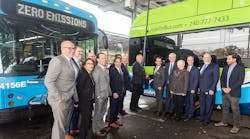Montgomery County and partners break ground on transit depot microgrid project
Montgomery County, Md., officials were joined by federal and state partners, as well as representatives from AlphaStruxure and Pepco to break ground on the David F. Bone Equipment Maintenance and Transit Operation Center (EMTOC) microgrid project on June 14.
EMTOC will feature an on-site electrolyzer, powered by solar and battery energy storage, making it the first transit bus depot on the East Coast to feature green hydrogen production. The facility will eventually power 200 hydrogen fuel cell and battery-electric buses for Ride-On Montgomery and, with the recently opened Brookville Smart Energy Depot, support the county’s target to be net zero emission by 2035 and achieve an 80 percent reduction by 2027.
The county reports the EMTOC will save 51,000 metric tons of carbon over 25 years, which is the equivalent of taking 10,000 cars off the road.
“This project represents a significant milestone in our ongoing efforts to achieve our ambitious climate action, which aims to reduce all carbon emissions by 2035 while substantially enhancing the resilience of our transit services. Of particular excitement is the integration of green hydrogen production, powered by the microgrid, highlighting our commitment to pioneering cutting-edge renewable solutions and leading by example when it comes to sustainable, resilient transportation,” said Montgomery County Executive Marc Elrich.
Powering the EMTOC with a microgrid
AlphaStruxure, a joint venture of Schneider Electric™ and Carlyle, will finance the microgrid that will power the depot through an Energy as a Service (EaaS) business model. AlphaStruxure explains EaaS allows “a long-term agreement ensuring predictable operating expenses and guaranteed performance without upfront capital expenditures.” Michael Yambrach of the county’s Office of Energy and Sustainability says EaaS allows the county to “de-risk” its fleet transition efforts.
“The buses, the trucks, all the other vehicles, there’s a supply chain [process] that people know how to do, but building out the infrastructure to support these fleets, with the increase in electricity demand, is a brand-new ballpark for everybody,” said Yambrach.
The primary components of the microgrid at EMTOC will be:
- 5.65 MWDC of rooftop and canopy solar generation
- Two MW / 6.88 MWh battery energy storage
- Up to 2.25 MW of charging capacity
- One MW hydrogen electrolyzer (procured directly by the county)
- Software tools and IoT-connected hardware
The microgrid will be interconnected to the Pepco utility and is engineered to operate in island mode indefinitely, ensuring uninterrupted service for the county’s constituents during extended grid or power outages and emergency situations. The county says its commitment to resilient infrastructure was strengthened following a 2012 derecho, which left many county residents without power. With the microgrid operating in island mode, Ride-On Montgomery’s buses will be able to make pull out times and operate independent of other disruptions to the county’s grid.
“Once built, the EMTOC microgrid will be the gold standard for resilient, sustainable public transit. This project also further establishes Montgomery County, Md., as the nation’s leading municipality when it comes to embracing the transit infrastructure of tomorrow,” said Juan Macias, CEO of AlphaStruxure. “We are thrilled to be the county’s long-term partner on holistic infrastructure that delivers improved, cleaner services to constituents. Our Energy as a Service approach enables us to deliver an integrated bus fleet solution that is bolstered by a resilient energy supply, all without imposing any upfront costs or financial, construction or operating risks on the county. We are excited to be part of this innovative and transformative initiative that will shape the future of public transit for years to come.”

Mischa Wanek-Libman | Group Editorial Director
Mischa Wanek-Libman is director of communications with Transdev North America. She has more than 20 years of experience working in the transportation industry covering construction projects, engineering challenges, transit and rail operations and best practices.
Wanek-Libman has held top editorial positions at freight rail and public transportation business-to-business publications including as editor-in-chief and editorial director of Mass Transit from 2018-2024. She has been recognized for editorial excellence through her individual work, as well as for collaborative content.
She is an active member of the American Public Transportation Association's Marketing and Communications Committee and served 14 years as a Board Observer on the National Railroad Construction and Maintenance Association (NRC) Board of Directors.
She is a graduate of Drake University in Des Moines, Iowa, where she earned a Bachelor of Arts degree in Journalism and Mass Communication.





